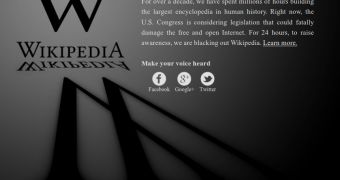The anti-SOPA blackout day has passed. Wikipedia is back to normal and most sites have resumed their activity. Wikipedia, which implemented a blackout yesterday, albeit not a very strong one, is now congratulating itself and the ones that took action for a job well done.
"The Wikipedia blackout is over — and you have spoken," Wikipedia cheered. "More than 162 million people saw our message asking if you could imagine a world without free knowledge."
"You said no. You shut down Congress’s switchboards. You melted their servers. Your voice was loud and strong. Millions of people have spoken in defense of a free and open Internet," it said.
Indeed, Wikipedia says that eight million people used the tool provided by it to look up information about their representatives in Congress. What's more, it says, the move lit up Twitter which became overrun by tweets concerning SOPA.
In all, Wikipedia is claiming it a success and rightfully so. Not in the sense that SOPA and PIPA are dead, they're not, but in the amount of attention the blackout managed to raise, which was its purpose after all.
Eight million people spurred to take action is quite an achievement. Of course, there's no way to know how many of those actually did something, all Wikipedia knows is that they looked up contact info. Probably, a significant number of those actually used that info.
At the same time, 154 million people that tried to access Wikipedia yesterday did not take action. Just five percent of visitors were moved enough to see what they could do, though not all of them actually contacted a senator or something similar.
95 percent of Wikipedia visitors during the blackout did nothing. There's no way to know why they didn't, there could be several reasons, they didn't care (enough) about SOPA, they were unable to do anything, since they were from outside of the US for example, or they didn't even understand what the blackout was all about.
At the same time, 162 million people tried to find information on Wikipedia, but couldn't. Granted, some of those visited Wikipedia precisely because of the blackout, traffic was up compared to a regular day.
What's more, those 162 million people could include mobile visitors, which were not affected by the blackout, they only saw a banner notifying them of the SOPA issue. Further, many people likely managed to access the info they wanted via the large number of ways the blackout could be bypassed. But that still leaves many tens of millions of people that were hindered in their quest for knowledge (or homework).

 14 DAY TRIAL //
14 DAY TRIAL //